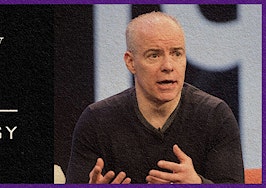Section 1031 of the Internal Revenue Code, which allows taxpayers to defer, not eliminate, payment of capital gains and recapture tax on the sale of property, has been in the federal tax code for the past 100 years.
There have been numerous proposals from elected officials to remove Section 1031 in order to allegedly “close a tax loophole” or pay for another government program.
In each instance, this battle-tested provision of the tax code passed the challenge of scrutiny. But that was only after lawmakers took the time to understand how Section 1031 impacts liquidity throughout the real estate market, revenue implications to Treasury as a result of a slowdown in transaction volume and its general impact on the U.S. economy as a whole.
Recently, Democratic presidential candidate Joe Biden announced his idea to create a $775 billion “caring economy” plan that seeks to support care for children and the elderly by raising taxes on real estate investors.
Although the intentions behind the plan are admirable, the means through which his campaign intends to finance this initiative are grossly misguided and need to be reconsidered.
Biden’s campaign plan is to eliminate certain preferences for real estate, and one major area the plan focuses on is the elimination of Section 1031 like-kind exchanges. The elimination of this tax provision, which has driven the buying and selling of investment property for the past century, would be devastating to our economy and would ultimately hurt the very people he’s trying to help with his proposal.
There were discussions about eliminating Section 1031 exchanges (for real estate transactions) when the Tax Cuts and Jobs Act of 2017 was passed as well. However, when our elected officials were presented with two separate impact studies by Ling and Petrova, and Ernst & Young LLP, both of which delineate the financial effect of limiting or elimination of Section 1031, the numbers articulated what pages of political soundbites might not have.
Elected officials quickly came to the realization that not only was the cost of like-kind exchanges to the Treasury grossly overstated, but that an outright repeal would devastate several important industries, harm the economy as a whole, and in the end, cost the government in the long run.
Both the Ling and Petrova and Ernst & Young studies address how Section 1031 creates liquidity throughout the real estate investment market, which provides incentives and support for real estate to achieve its highest and best use.
The transactional activity from trading out of yesterday’s real estate to a new piece of real estate to meet tomorrow’s needs is a catalyst for a stream of economic activity.
It creates jobs and taxable revenue for Realtors, qualified intermediaries, title companies, escrow, insurers, lenders, contractors, inspectors, appraisers, building supply vendors and more. It also generates revenue for local and state governments through transfer taxes, permitting fees and increased tax basis from upgraded buildings and improved communities.
Here are some key findings from the Ling and Petrova study:
Finding No. 1
Like-kind exchanges encourage investment. On average, taxpayers using a like-kind exchange acquire replacement property that’s approximately 33 percent more valuable than the relinquished property.
Finding No. 2
Like-kind exchanges provide only temporary tax deferral. The overwhelming majority (88 percent) of real estate replacement properties acquired through a like-kind exchange are disposed through taxable sales, not subsequent like-kind exchanges.
Finding No. 3
It leads to job creation. Real estate acquired through a like-kind exchange is associated with greater investment in capital expenditures (i.e., job-creating property upgrades and improvements) than real estate acquired without the use of like-kind exchanges.
Here are some key findings from from the Ernst & Young study
Finding No. 1
Repeal of Section 1031 would subject businesses to a higher tax burden on their transactions, resulting in a longer holding periods (the “lock-in” effect).
Finding No. 2
Repealing 1031 rules would slow economic growth, shrink investment and ultimately reduce gross domestic product.
Finding No. 3
The study concludes that repeal of the 1031 would adversely impact the U.S. economy by discouraging investment, causing a reduction in GDP and a contraction in the economy, and would unfairly burden certain industries and taxpayers.
In addition to these studies, it’s an empirical fact that Section 1031 stimulates America’s vital agricultural sector. Farmers and ranchers use Section 1031 to combine acreage or acquire higher-grade land or otherwise improve the quality of their operations.
Retiring farmers can exchange their most valuable asset — their farm or ranch — for other real estate without diminishing the value of their life savings.
Section 1031 is also used to promote conservation and environmental policies. Grants of conservation easements can be structured as tax-deferred exchanges, facilitating government and privately funded programs designed to improve water quality, reduce soil erosion, maintain wetlands and sustain critical wildlife habitat. These exchanges also enable landowners to acquire replacement farm or ranchland in less environmentally sensitive locations.
In addition, with the current COVID-19 pandemic, recession and economic upheaval, the idea of eliminating Section 1031 would be the final straw that would break the commercial real estate markets.
It’s very important that the real estate community makes its voice heard in Washington about the importance of the Section 1031 like-kind exchange — that it creates and preserves jobs and that it’s used by a broad spectrum of taxpayers, from middle-class and small businesses to large enterprises, to synergistically spur on our economy.
Please let your members of Congress know that the 1031 like-kind exchange is important to you, your clients and our American economy.
The Inland Real Estate Group of Companies, Inc., is a proud member of several organizations that support Section 1031 like-kind exchange and will be working with them to educate our elected officials as to the importance of Section 1031. These organizations include the National Association of Realtors and Mortgage Bankers Association, among others.
Dan Wagner is the senior vice president of government relations at The Inland Real Estate Group of Companies, Inc. and the 2018 President Elect of the Illinois Realtors. Connect with him on LinkedIn and Facebook.













